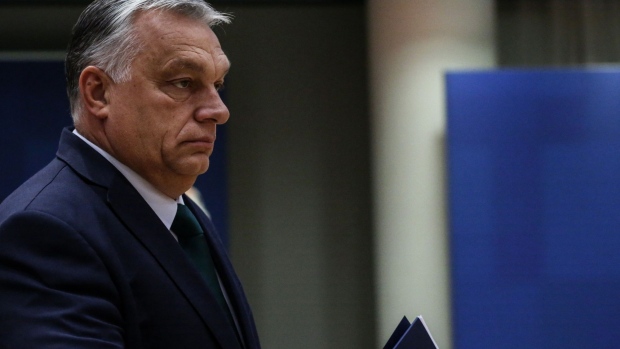Nov 24, 2022
Hungary Downplays Impact of Reports EU is Set to Delay Funds
, Bloomberg News

(Bloomberg) -- Hungary sought to downplay the impact of reports that the European Union is poised to withhold crucial funding for longer, saying efforts by Prime Minister Viktor Orban to allay the bloc’s rule-of-law concerns will allow the aid to arrive next year.
The European Commission is poised to endorse Hungary’s Covid-recovery plan but is leaning toward recommending that member states withhold €7.5 billion ($7.8 billion) in aid until further benchmarks are met, people familiar with the deliberations told Bloomberg on Wednesday.
On Thursday in Budapest, however, ministers from Orban’s government said they were still on track to sign both the Covid-recovery plan and a 2021-2027 budget agreement. That would avert a worst-case scenario in which Hungary would lose €4.1 billion euros in funding for good if the Covid plan isn’t endorsed by Dec. 31, even if the disbursement of the money is delayed.
Cabinet Minister Gergely Gulyas and EU Funds Minister Tibor Navracsics spoke as the government and central bank struggle to arrest a plunge in the forint, which has fallen more than 2% against the euro since Tuesday. The decline erased a rally that prevailed for much of the past month on optimism that Hungary was on track on escape financial penalties.
“The commission’s position didn’t shake us and didn’t divert us from our original timetable,” Navracsics said.
Hungary’s government estimates that fresh funds from the Covid-recovery plan and the new multi-year budget period may start flowing in the second quarter of next year, after it meets demands by the end of March to bolster judicial independence, Gulyas said.
He estimated that altogether 7 billion euros of EU funds may arrive in 2023, mostly leftovers from the 2014-2020 budget but also including Covid recovery money, as well as a share of the 2021-2027 funding that won’t be held back in any scenario.
But the central European nation is facing intensifying criticism after Orban’s government has for years challenged the EU’s democratic and multi-cultural values. It has also faced accusations of blackmail by fellow member states for resisting measures the bloc has pursued on everything from immigration to Russian sanctions.
On Thursday, the European Parliament overwhelmingly passed a non-binding resolution calling for the EU’s executive arm, the European Commission, to stick with a September proposal to suspend the funds. The measures the government have taken are “not sufficient to address the existing systemic risk to the EU’s financial interests,” according to the resolution.
Since September, Orban’s government had sought to meet EU demands to unlock funds and reduce or erase any financial penalties it may accrue for failing to meet benchmarks on improving the rule of law. Those steps included passing a flurry of anti-graft amendments that included the creation of a new anti-corruption authority.
The commission sees Hungary as having made significant progress addressing the bloc’s concerns, but some issues remain outstanding, according to the people familiar with the deliberations, who asked not to be identified because the talks are private.
Hungary sees little chance that EU finance ministers, who make the final decision on the months-long rule of law probe, will amend the reported European Commission proposal at a Dec. 6 meeting. The commission is formally scheduled to publish its assessment next week.
©2022 Bloomberg L.P.






